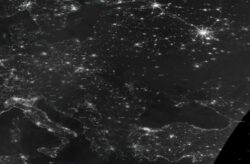Recent satellite imagery lays bare the scale of damage inflicted on Ukraine’s power grid by Russian attacks (Picture: Reuters)
Satellite imagery has shown how Ukraine has plunged into darkness after Russian missile strikes wrecked the country’s power grid.
The photos taken from the sky indicate the night radiance of Europe from space.
They show Russia and neighbouring European countries lighting up the night sky with power generated by their major population hubs.
Ukraine’s power output meanwhile looks to be almost nonexistent, after nine months of brutal conflict have left the country almost totally devoid of electricity.
Russian strikes on Ukraine’s energy infrastructure have increased massively since October, as the Kremlin seeks to offset their losses on the battlefield by terrorising civilians in hopes of freezing them to death over the winter.
Further strikes on the country’s infrastructure killed an additional 10 people this week and disconnected three Ukrainian nuclear power plants from the national grid.
So severe were the attacks that they even triggered blackouts in neighbouring Moldova, whose energy network is linked to Ukraine.
Such attacks have forced millions of people to go without light, water or heating for hours or days at a time, just as outdoor temperatures fall below freezing.
Russian missile attacks have plunged the country into darkness ahead of winter (Picture: NASA)
Similar images captured at the start of the year showed Ukraine to be as brightly lit as any other European country, but in the most recent shots only Kyiv and Lyiv, the country’s western-most city and the one furthest away from the conflict can be seen to be emitting any serious light.
In the east of the country, where the bulk of the fighting has taken place, there appears to be a near-total blackout, with recently liberated cities such as Kherson and Kharkiv being almost total devoid of power.
Occupied territories such as Dnipro and Zaporizhzhia are also almost totally invisible, while the city of Mariupol, which was completely levelled by Russian missiles in the early stages of the war, has quite literally been wiped off the map.
Ukrainian authorities have been desperately trying to fix their country’s battered power grid in time for winter, but repeated shelling by Russians has left the whole system on the brink of collapse.
The World Health Organisation has since warned of ‘life-threatening’ consequences if the grid is not fixed and estimated that millions could lose their homes as a result.
Kyiv mayor Vitali Klitschko said two thirds of residents in the city have been left without heating ahead of winter (Picture: AP)
Eastern cities such as the recently-liberated Kherson are almost totally disconnected from the power grid (Picture: AP)
In a recent update, Kyiv mayor Vitali Klitschko said a third of houses in the area now have heating, but over half of the city’s residents remain without electricity.
‘Seventy percent of the capital remains without electricity,’ Klitschko said.
‘Energy companies are making every effort to return it as soon as possible’, he added.
In some areas around the country residents have been forced to queue for water or collect it from drain pipes as authorities scramble to reconnect their damaged water grids, while recent pictures from Lviv showed individuals sitting by candlelight, not far from the Polish border.
Lviv mayor Andriy Sadoviy tweeted on Wednesday that the whole city is without light’ and there could also be further interruptions to the water supply.
And in shocking scenes captured earlier the week, surgeons were forced to perform complex heart surgery on a child by torchlight after a missile strike caused a blackout midway though the operation.
Many European countries have since pitched in to help Ukraine stay warm over the winter, with French foreign minister Catherine Colonna pledging to deliver 100 high-powered generators to Ukraine as soon as possible.
Meanwhile, British foreign minister James Cleverley recently met with President Zelenskyy during a diplomatic trip to Kyiv and promised a £50m air-defence package to help defend against Russia’s bombardments.
‘Words are not enough. Words won’t keep the lights on this winter. Words won’t defend against Russian missiles,’ Mr Cleverly wrote in a tweet concerning military aid.
NATO’s secretary-general Jens Stoltenberg also showed support, saying the alliance is determined to help Ukraine defend itself for ‘as long as it takes’.
Get in touch with our news team by emailing us at webnews@metro.co.uk.
For more stories like this, check our news page.
Satellite images from NASA depict Ukraine in almost total darkness as a result of Russian strikes on the country’s power grid.





